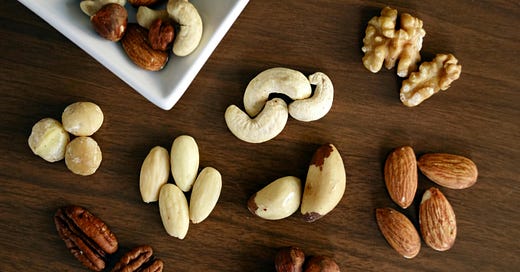Essential Fats, Human Biology & the Truth About DHA
Are plant-based omega-3s enough? And what does our metabolism tell us about the kind of diet we’re designed to thrive on?
We’ve long been told that omega-3s — particularly DHA and EPA — are nutrients best obtained from fish. It’s one of the few arguments still routinely made against plant-exclusive diets. But is it truly necessary to supplement with DHA? And what does our body’s own fatty acid metabolism tell us about our evolutionary design?
Let’s explore the evidence.
What Are Essential Fatty Acids?
Essential fatty acids (EFAs) are fats that the body cannot produce on its own. They must come from food. The two that are essential for human health are:
Alpha-linolenic acid (ALA) – an omega-3 fat
Linoleic acid (LA) – an omega-6 fat
Both are found abundantly in plants — flax, chia, hemp, walnuts, and a new non-GMO source called Ahiflower. Once ingested, the body can use ALA to produce EPA and DHA, the long-chain omega-3s more commonly associated with fish.
Yet for years, it’s been assumed that plant-based diets can’t provide adequate EPA or DHA — based largely on early research that measured blood levels rather than tissue function. That assumption is now being challenged.
Blood Levels Aren’t the Whole Story
Low circulating DHA doesn’t necessarily mean poor brain or tissue levels. Newer methods — like isotope tracing — show that the body can convert ALA to DHA where it’s needed, such as in the brain, even if it doesn’t appear elevated in the blood.
In fact, artificially raising blood DHA through supplements may have unintended consequences. Some studies suggest excess circulating DHA may interfere with EPA’s heart-protective benefits, increase LDL cholesterol, and raise the risk of atrial fibrillation.
Conversion Is Smarter Than We Thought
The body regulates DHA production based on need. When people stop supplementing or consuming preformed DHA (found in fish or algae supplements), endogenous conversion from ALA ramps up. Vegans typically show higher conversion rates than omnivores, as their metabolism compensates for lower external intake.
This regulation depends on several factors:
Dietary composition (e.g. saturated fat and omega-3 DHA intake hinder conversion)
Life stage (conversion increases in pregnancy, for example)
Genetic variants (such as FADS1 and FADS2 polymorphisms)
For individuals with impaired conversion, stearidonic acid (SDA) offers a powerful solution. Unlike ALA, SDA bypasses the rate-limiting enzyme (delta-6 desaturase), converting to EPA far more efficiently. Ahiflower is the richest known natural plant source of combined ALA and SDA, and studies show it may match or exceed fish oil in clinical outcomes — without the metabolic suppression linked to high-dose DHA.
Brain Health, Methylation & B12
Concerns around brain health and cognition are often misplaced. Conversion to DHA naturally increases during pregnancy, and many vegan populations show no higher incidence of neurodegenerative disease when other factors — like B12 — are accounted for.
B12, B6 and folate are essential for methylation, the biochemical process that enables DHA to cross into brain cells. Without adequate B12 status, even those consuming DHA may struggle to utilise it effectively.
Lifestyle Makes the Difference
Studies consistently show that:
People with higher fruit and vegetable intake have slower cognitive decline
Polyphenols (e.g. curcumin) support neuroprotection
Physical activity and fibre-rich diets enhance omega-3 function
Vegans typically have lower inflammation, improved blood lipids, and better metabolic profiles — reducing the need for high circulating DHA in the first place
Some fish and DHA studies reflect lifestyle confounders: people who choose fish tend to make other health-conscious choices. This makes it difficult to isolate the effects of fish oil alone.
The Bigger Picture: Efficiency, Ecology & Evolution
When we step back and ask what kind of system the human body is running, we see a design that:
Makes long-chain omega-3s when needed
Increases production under demand
Stores DHA in fat tissue for long-term access (up to 12 years' worth)
Requires an estimated only 2.4–3.8mg/day of DHA, an amount easily synthesised from ALA in most well-nourished vegans
The reliance on fish or algae oil may not be necessary — and in some cases, not even ideal. Humans appear biologically equipped to obtain essential fats from plants and microbes, not animals. That makes sense when we consider evolutionary patterns, environmental impact, and modern health data.
Summary
ALA and LA are the only fatty acids we must consume — and both come from plants
EPA and DHA can be synthesised internally, particularly when dietary status is optimised
Blood DHA is not a reliable marker for brain health
Excess DHA may have negative effects, including on heart rhythm and cholesterol
SDA from Ahiflower offers an efficient path to EPA and DHA without the drawbacks of fish oil
B12 and methylation support are critical for proper omega-3 function
Lifestyle factors — from fibre intake to stress reduction — may be more important than supplementation
Final Thought
When we trust the body’s intelligence and nourish it with the right inputs — including ALA, SDA, B12, and anti-inflammatory plants — we support a system that’s built to thrive. We don’t need to outsource our health to the ocean or rely on high-dose extracts to feel well.
The emerging science makes one thing increasingly clear:
A plant-based approach to essential fats is not just possible — it may be optimal.
For further related information, resources and references please head to: https://camillaclare.com/why-i-dont-recommend-algae-dha-for-vegans/
🌿 If you're plant-based and not feeling your best — whether it’s low energy, skin issues, gut discomfort or just a sense that something’s off — I offer 1:1 naturopathy sessions specialising in plant-based nutrition.
My approach is gentle, evidence-based, and completely aligned with your ethics. You don’t need to give up your values to feel well.
You can learn more or book a session at camillaclare.com — I’d love to support you.



